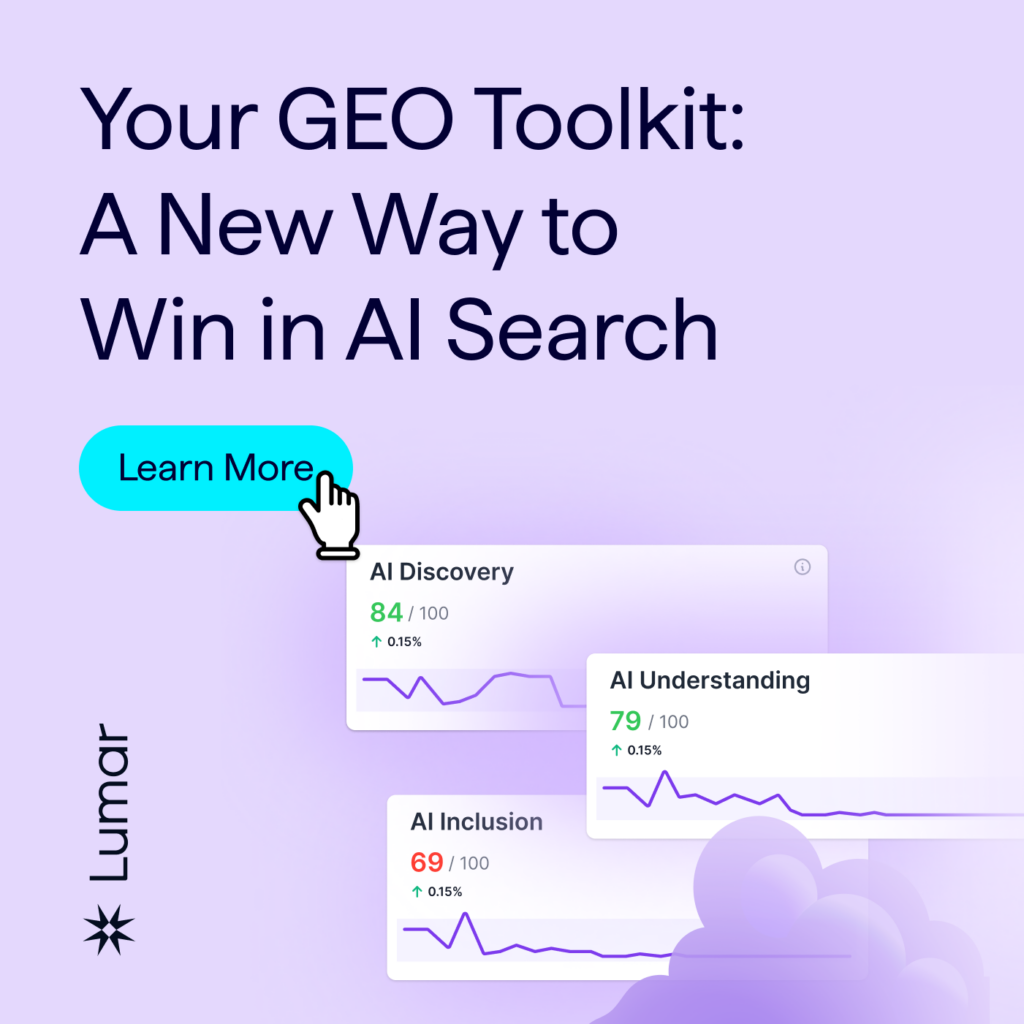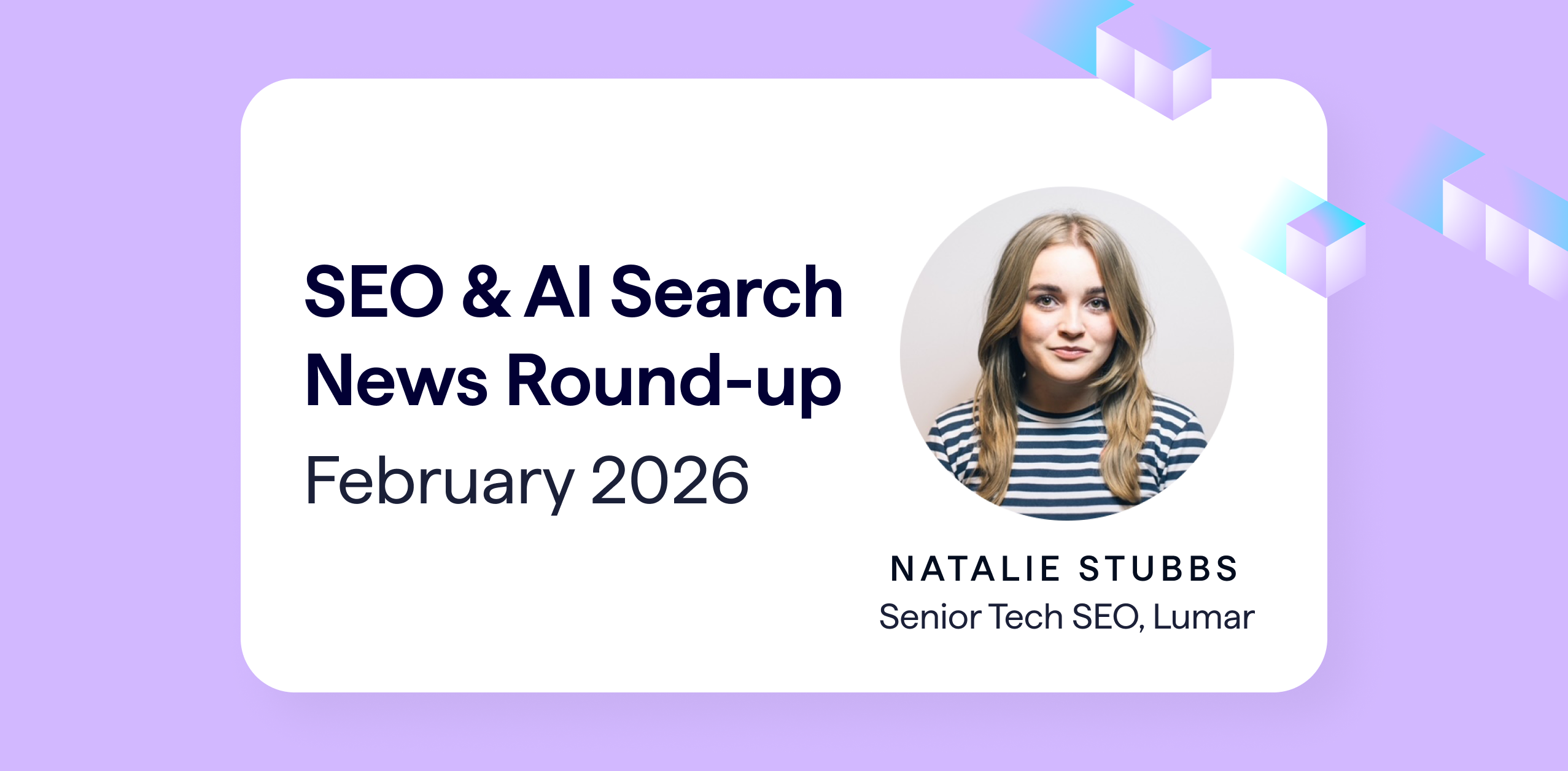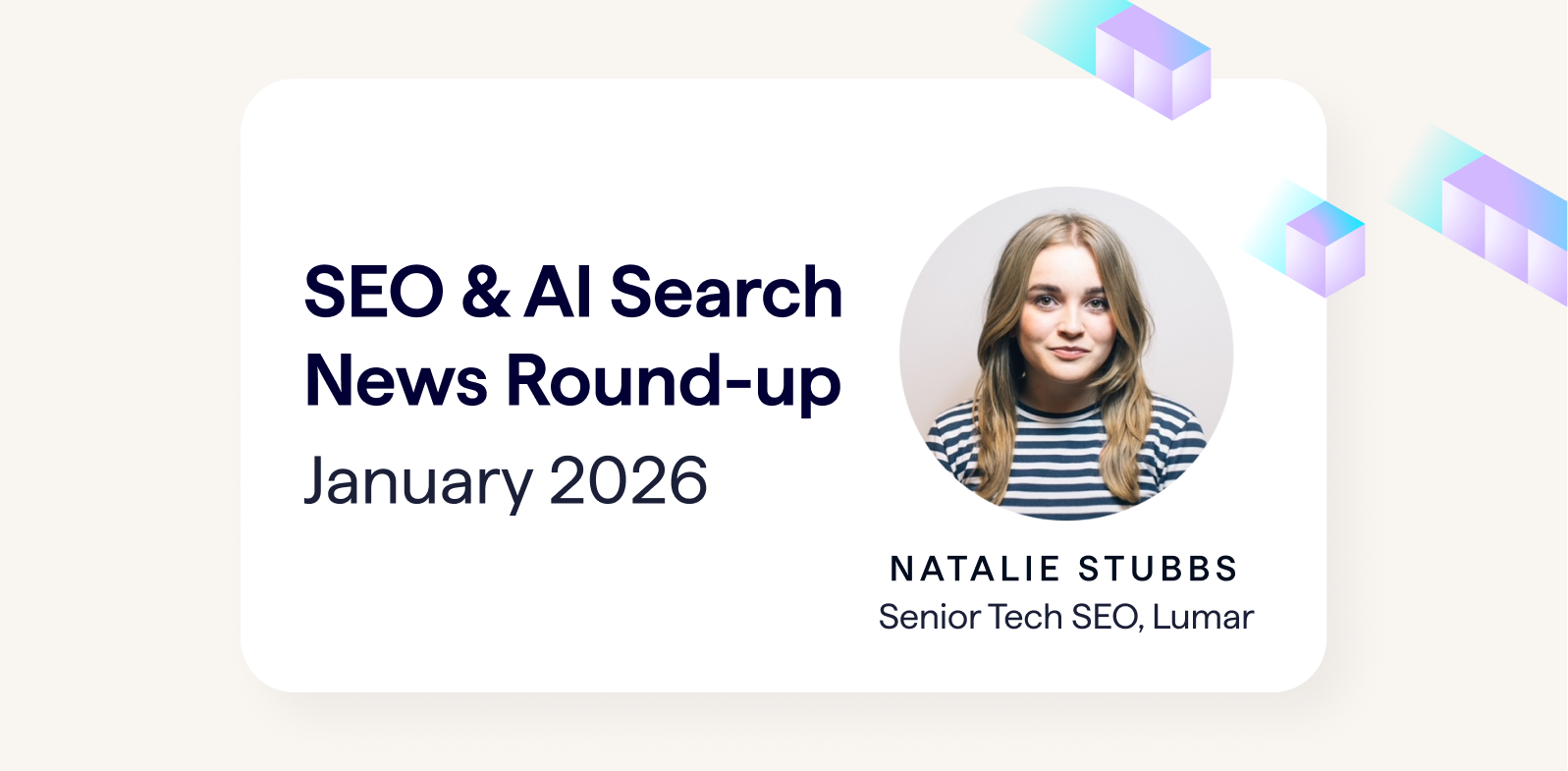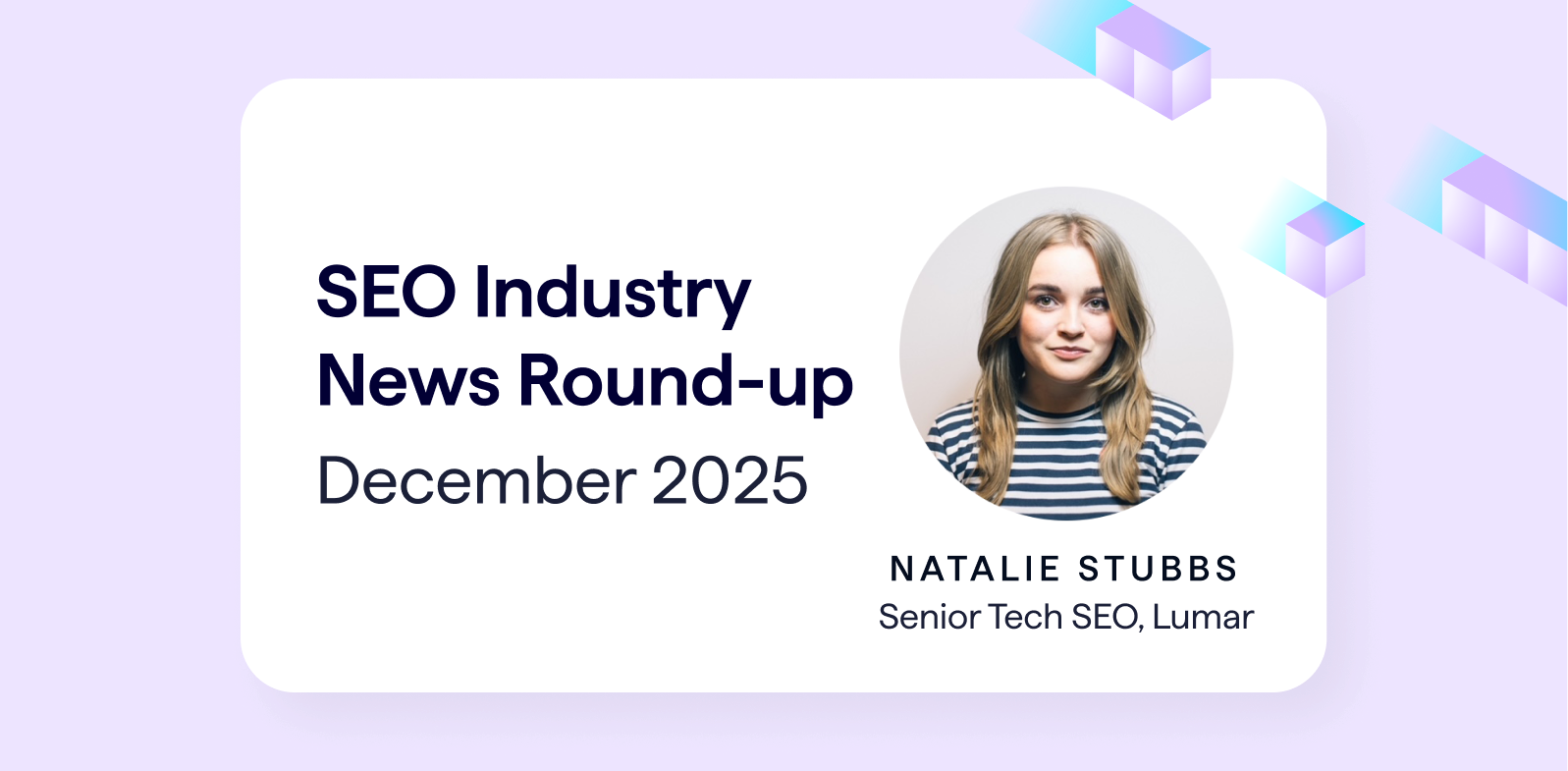What happened in the SEO industry this month?
Each month, Lumar’s in-house tech SEO experts hand-pick some of the SEO industry’s top news stories from across the web to keep you up-to-date on all things SEO and website optimization.
For our November 2025 SEO & AI search news roundup, the top headlines include:
- Google launches Gemini 3 — and immediately implements it in AI Mode searches
- Perplexity’s Comet browser is now available on Android — and the company inks a new deal to power AI search in Snapchat
- New GSC tools for branded queries and custom annotations
- SERP CTR data and insights for Q3 2025
- And much, much more below!
Now, let’s dig further into the key SEO & GEO/AEO news you need to know this month…
But first, did you know you can now optimize your website for AI search with Lumar?
Lumar’s GEO tools for AI search optimization provide data-driven insights to help you optimize your website for AI-driven search visibility, earn more AI citations, and improve brand visibility across LLMs.
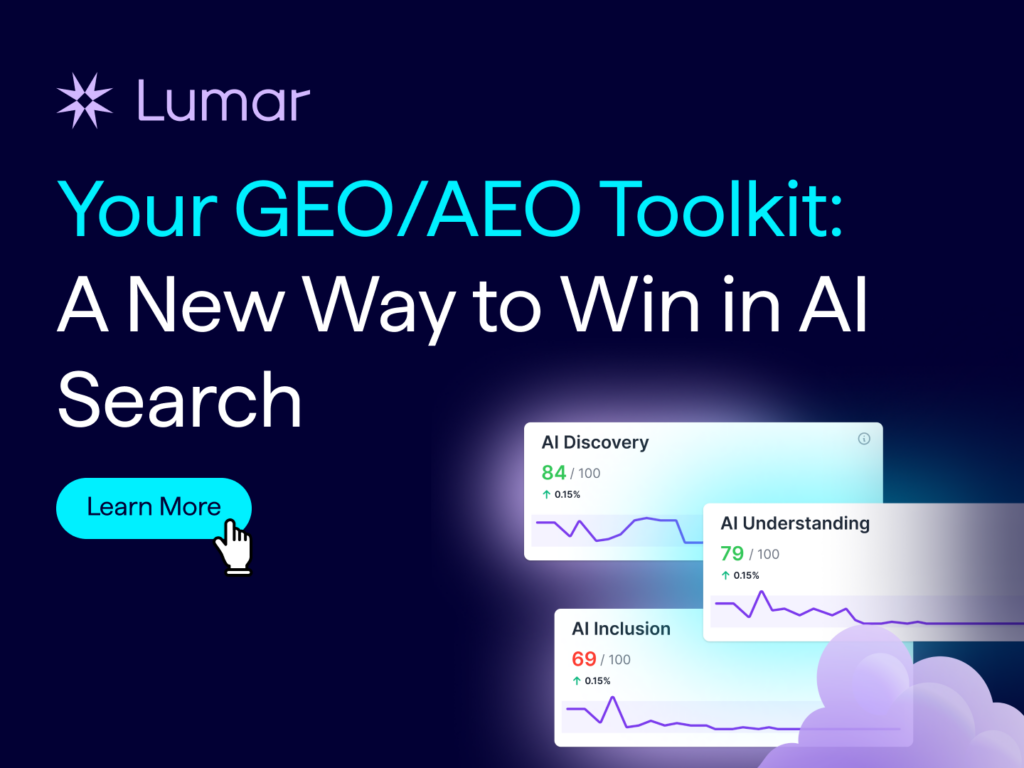
Google news SEO pros need to know this month:
Google launches Gemini 3 and brings the model directly into AI Mode in Google Search
Google launched Gemini 3, its most capable AI model yet, on November 18, 2025, and integrated it directly into AI Mode within Google Search — marking the first time Google has brought a Gemini model to Search on day one.
The initial rollout is available to Google AI Pro and Ultra subscribers in the U.S., who can switch to the new “Thinking” option to run complex queries on the Gemini 3 Pro model. Google Search will also soon begin automatically routing harder questions within AI Mode (and later, AI Overviews) to Gemini 3 while relying on lighter variants for faster everyday responses.
With Gemini 3, AI Mode gains stronger reasoning, improved query fan-out (running more intelligent background searches to surface additional sources), and new generative UI layouts, including interactive simulations, calculators, images, tables, and other mini-tools embedded directly inside answers. Google describes this as a shift toward more “intelligent,” multimodal, and agentic responses that change both how answers are assembled and how sources are discovered and cited—reshaping where visibility comes from in Google’s evolving AI-driven search experiences.
“Gemini 3’s state-of-the-art reasoning grasps depth and nuance, and unlocks new generative UI experiences with dynamic visual layouts, interactive tools and simulations tailored specifically for your query.” — Elizabeth Reid, VP, Head of Search, Google
(Sources: Google’s The Keyword Blog, Google’s Gemini 3 Announcement ; Search Engine Journal )
Ads are appearing in AI Mode search results as testing continues
Ads in Google’s AI Mode search results are starting to be spotted “in the wild.” 9to5Google reports that sponsored ad cards are now intermittently appearing at the bottom of some AI Mode responses, with Google confirming to the outlet that these are part of the AI Mode ad tests previously announced in May. Search Engine Roundtable also shared early screenshots of Google AI Mode ads appearing this month, confirming that more users are encountering sponsored blocks in the AI search interface.
(Sources: 9to5Google ; Search Engine Roundtable ; Greg Sterling on LinkedIn ; Brodie Clark on X)
Some AI Overview results now warn users to double-check important info
Some users have noted that Google has implemented a larger, more explicit disclaimer in some AI Overviews that advises users to “Double-check important information” and verify critical answers using multiple sources, especially in YMYL categories. This step has likely been implemented to address concerns over AI hallucinations and safety by officially framing the AI Overview as a starting point, not a definitive source.
Note: The disclaimer language surrounding the flag at the bottom of AI Overviews also changes based on the query — usually stating in small text, “AI responses may include mistakes.” For a financial YMYL query around stock-picking, however, the flag instead says: “AI responses may include mistakes. For financial advice, consult a professional.”
(Sources: Search Engine Roundtable ; Valentin Pletzer on X)
Google turns AI Mode into an agentic travel planner
Google is adding major travel-planning capabilities to AI Mode. Users can now use the Canvas tool within AI Mode to build customized itineraries by simply describing their trip. Google will pull in real-time flight and hotel data, Google Maps reviews, and web content, allowing follow-up refinements and saving the plan for later.
The search giant is also rolling out “agentic” booking in AI Mode — users in the U.S. can now make restaurant reservations via partners like OpenTable and Tock directly inside AI Mode, with flights and hotels to follow pending partnerships with Booking.com, Marriott, and Expedia.
(Source: Google’s The Keyword Blog, “New ways to plan travel with AI in Search”)
Google Search Console adds branded query filter & custom annotations
Google has announced a new branded queries filter in Search Console performance reports, allowing you to segment results into branded vs non-branded queries. The feature is intended to make it easier to understand how much traffic comes from brand demand versus generic discovery and to report on branded trends more cleanly.
Google is also adding support for custom annotations directly onto the GSC performance report timeline. This highly feature lets you easily log crucial events—such as algorithm updates, site migrations, product launches, or content campaigns—directly in your data view, making performance diagnosis faster and more accurate than ever.
(Sources: Google Search Central: branded queries filter announcement and custom annotations in GSC announcement ; Eli Schwartz on LinkedIn)
New Google CTR data shows clicks are more distributed on branded search & longer queries maintain stronger CTR
New Q3 Google Search click-through rate (CTR) data from Advanced Web Ranking shows that branded desktop queries are distributing clicks more widely across positions, with position 1 losing about 1.52 CTR percentage points while positions 2–6 gained a combined 8.71 points.
Commercial and local-intent queries saw the sharpest CTR declines at the top spot, continuing a trend of eroding first-position CTR in highly monetized SERPs.
Meanwhile, longer queries (4+ words) held position-1 CTR steady on desktop, while 2- and 3-word queries each dropped by around 1.2 points. On mobile, one-word queries gained roughly 1.52 points at the top.
Together, these signals suggest that user behavior that results in SERP clicks is shifting toward more specific, intent-rich phrasing, while generic and high-competition keywords continue to fragment across more result types.
(Source: Search Engine Journal)
OpenAI, Perplexity, & Anthropic news SEO pros need to know this month:
ChatGPT launches group chats globally
OpenAI is rolling out group chats in ChatGPT worldwide across Free, Go, Plus, and Pro plans following a short pilot in markets like Japan and New Zealand. The new group ChatGPT features allows up to 20 people to collaborate with ChatGPT in a single thread. Users can co-plan trips, co-write documents, and debate decisions while ChatGPT joins in when tagged, with each person’s settings and memory kept private.
Per the pop-up banner on OpenAI’s release documentation: “We are gradually rolling out group chats in ChatGPT. Some users may not see this feature yet as we increase availability in stages.”
(Sources: OpenAI ChatGPT Release Notes ; TechCrunch)
OpenAI launches GPT-5.1 to improve reasoning and conversational quality
This month, OpenAI released GPT‑5.1, offering two variants — Instant and Thinking — that dynamically balance speed and deep reasoning while aiming for a more natural conversational style. GPT-5.1 Auto will continue to route each query to the best model.
Per the release notes, the Instant variant of GPT-5.1 will now use light adaptive reasoning for tougher questions while staying fast, while the Thinking variant adapts its thinking time more precisely for complex tasks with clearer, less jargony responses. The prevoius GPT-5 models will remain available as legacy options for several months.
(Source: OpenAI ChatGPT Release Notes, November 21, 2025)
Anthropic highlights more “introspective” and transparent Claude models
Axios reported this month that Anthropic’s latest Claude models are starting to be more “introspective,” with research suggesting they can reason about and verbalize aspects of their own internal decision-making processes. Anthropic researcher Jack Lindsey told Axios that this is a step toward more interpretable systems, which could eventually help teams understand why AI search and agentic flows surface specific answers or recommendations — an important concern for GEO and AI governance.
(Source: Axios)
Perplexity launches its Comet AI browser on Android
This November, AI search company Perplexity has released its Comet AI browser on Android operating systems, bringing most of the desktop version’s AI search features to users’ mobile devices. The desktop version of Comet was initially launched in July 2025. Android users can now set Perplexity as their default search engine, ask questions about open tabs (including via voice), and have the AI assistant summarize or research across all tabs, with an integrated ad blocker and plans for more agentic actions and a password manager. TechCrunch
(Source: TechCrunch)
Amazon sues Perplexity over its ‘agentic’ Comet shopping assistant
Reuters reports that Amazon has initiated legal action against Perplexity over its Comet browser’s “agentic” shopping feature. Per Reuters reporting, Amazon accuses the agentic shopping tool of covertly accessing customer accounts and disguising automated activity as human browsing, arguing it constitutes platform trespassing and poses security risks. Per Reuters: “The clash highlights an emerging debate over regulation of the growing use of AI agents and their interaction with websites…”
(Source: Reuters)
Perplexity inks deal to power AI search inside Snapchat’s “My AI” chatbot
Perplexity agreed to pay Snap $400 million in cash and equity to integrate its AI search technology directly into Snapchat’s “My AI” chatbot, according to TechCrunch this month. This deal will give Perplexity a massive chat-native audience and positions conversational search as a core experience within a major social platform, potentially encouraging users to bypass conventional search engines.
(Source: TechCrunch)
Perplexity’s Comet browser enables multi-tab AI tasking
Perplexity upgraded its Comet Assistant AI this month to support complex, multi-step requests by multitasking across multiple browser tabs. The agent can now manage research and comparisons across different sites while implementing new guardrails that require explicit user permission before taking direct action (like filling forms). Internal tests showed a 23% improvement in task completion rates.
(Sources: Perplexity announcement ; TechRadar)
More SEO & AI search news:
Cybersecurity experts say AI browser agents pose a larger risk to user privacy compared to traditional browsers.
New AI-powered browsers with agentic capabilities—such as the ability to click links, fill forms, and navigate sites on a user’s behalf—are triggering fresh cybersecurity alarms. Cybersecurity experts speaking to TechCrunch last month warned that these AI browsers often request far greater access across email, calendar, and authentication sessions, thereby increasing risk. They also point to the potential for prompt-injection attacks, where malicious instructions embedded in webpages trick the agent into executing unintended actions, bypassing traditional browser protections.
(Source: TechCrunch)
UK regulator Ofcom flags “answer engines” as a new online gatekeeper and seeks input
Ofcom, the UK regulator, published a discussion paper this month warning that “answer engines” (generative AI chatbots and AI search summaries) could become influential online gatekeepers. The paper examines the potential for AI intermediaries to steer users toward a small set of answers and services, raising systemic concerns about competition, plurality, and safety that could lead to new regulatory obligations regarding transparency and source attribution. For SEO and GEO practitioners, the paper is an early sign that regulators are watching AI search behavior as a systemic issue, not just a product feature.
GenAI market share snapshot: ChatGPT still leads, but Gemini, Perplexity and Claude keep growing
First Page Sage data reported on November 7, 2025 showed ChatGPT leading the U.S. generative AI chatbot market share at 61.0%, with Microsoft Copilot (14.1%) and Google Gemini (13.4%) following. However, Claude AI (14% quarterly growth) and Perplexity (13% quarterly growth) demonstrated the fastest expansion, highlighting a splintering market that may require multi-platform GEO/AEO optimization strategies.
(Source: First Page Sage)
Study finds LLMs.txt barely moves the needle on AI citations
An SE Ranking analysis of 300,000 domains concluded there is, thus far, little evidence that implementing LLMs.txt meaningfully increases how often large language models cite a site in their answers. Adoption of the standard is still relatively low, however, and the study didn’t see a consistent uplift in AI citations for sites that used it compared to those that didn’t. While LLMs.txt may still be useful for communicating preferences to AI crawlers, the findings suggest it is not a magic lever for AI visibility today. SEOs are advised to treat it as one tactical safeguard among many, not a primary GEO strategy.
(Source: Search Engine Journal)


